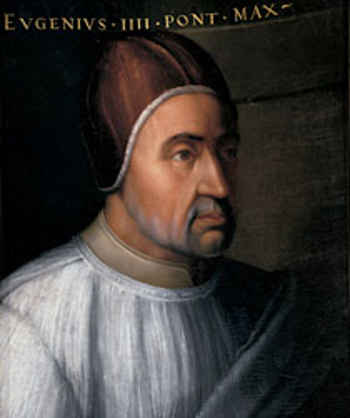Pope Eugene IV
|
Pope Eugene IV |
|
|---|---|
| Bishop of Rome | |
 |
|
| Papacy began | 3 March 1431 |
| Papacy ended | 23 February 1447 |
| Predecessor | Martin V |
| Successor | Nicholas V |
| Orders | |
| Consecration | 1408 |
| Created Cardinal | 9 May 1408 by Gregory XII |
| Personal details | |
| Birth name | Gabriele Condulmer |
| Born | 1383 Venice, Republic of Venice |
| Died | 23 February 1447 (aged 63–64) Rome, Papal States |
| Coat of arms |  |
|
Papal styles of Pope Eugene IV |
|
|---|---|
 |
|
| Reference style | His Holiness |
| Spoken style | Your Holiness |
| Religious style | Holy Father |
| Posthumous style | None |
Pope Eugene IV (Latin: Eugenius IV; 1383 – 23 February 1447), born Gabriele Condulmer, was Pope from 3 March 1431 to his death in 1447. He is the last pope to take the name "Eugene" upon his election.
Condulmer was born in Venice to a rich merchant family. He entered a community of Canons Regular of San Giorgio in Alga in his native city. At the age of twenty-four he was appointed by his maternal uncle, Pope Gregory XII, as Bishop of Siena. In Siena, the political leaders objected to a bishop who was not only 24, but also a foreigner. Therefore, he resigned the appointment, becoming instead his uncle's papal treasurer, protonotary and Cardinal Priest of the Basilica of San Clemente.
Pope Martin V named him Cardinal Priest of the Basilica di Santa Maria in Trastevere. He also served as papal legate at Picenum in the March of Ancona.
Condulmer was quickly elected to succeed Martin V in the papal conclave of 1431. He was crowned as Eugene IV at St. Peter's Basilica on 11 March 1431. By a written agreement made before his election he pledged to distribute to the cardinals one-half of all the revenues of the Church and promised to consult with them on all questions of importance, both spiritual and temporal. He is described as tall, thin, with a winning countenance, although many of his troubles were owing to his own want of tact, which alienated parties from him. Upon assuming the papal chair, Eugene IV took violent measures against the numerous Colonna relatives of his predecessor Martin V, who had rewarded them with castles and lands. This at once involved him in a serious contest with the powerful house of Colonna that nominally supported the local rights of Rome against the interests of the Papacy. A truce was soon arranged.
...
Wikipedia
